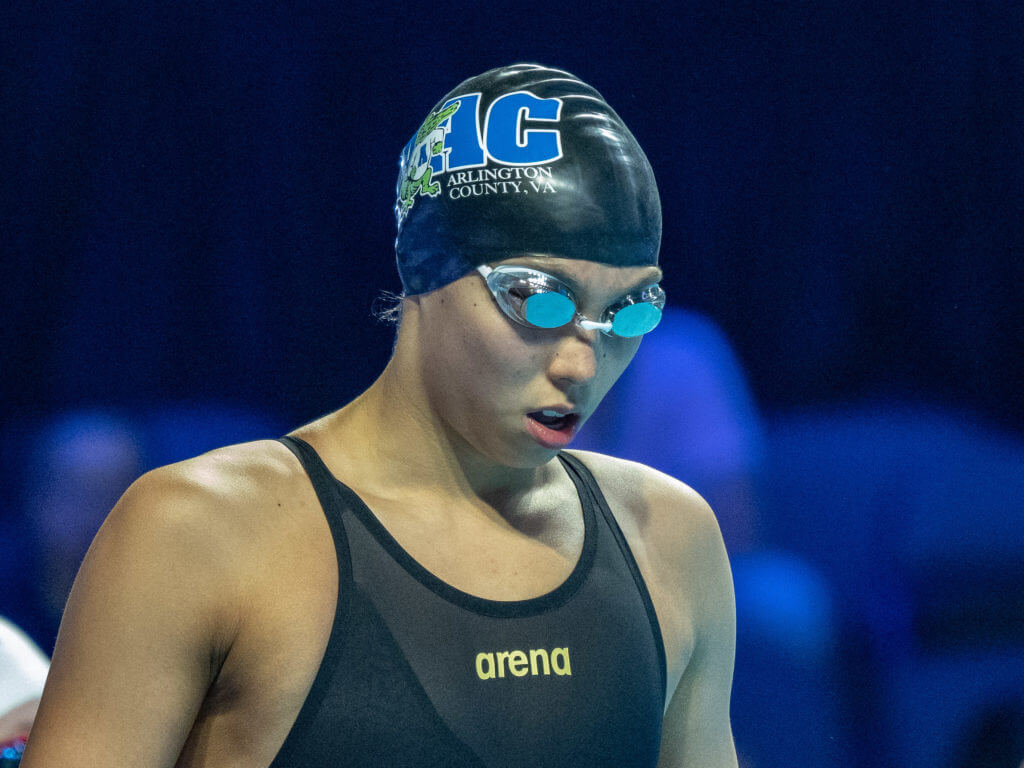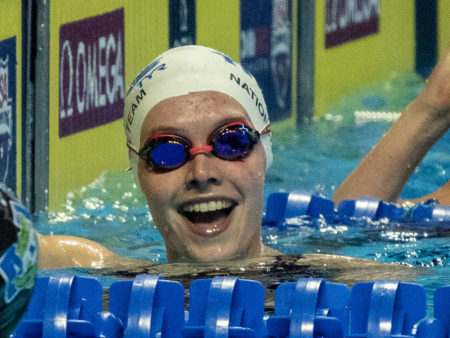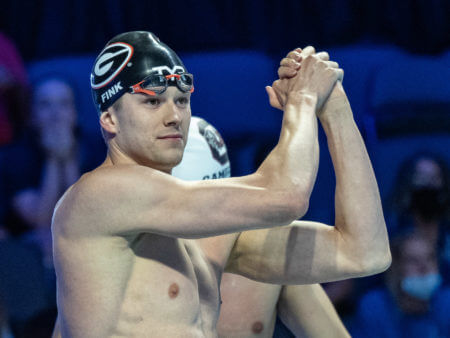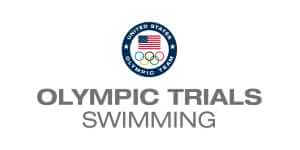U.S. Olympic Trials, Day 2 Notebook: Teenagers Huske and Curzan Already Thriving at Pressure-Packed Trials

U.S. Olympic Trials, Day 2 Notebook: Teenagers Huske and Curzan Already Thriving at Pressure-Packed Trials
The first of Monday night’s finals at the U.S. Olympic Trials could show something of a generational shift as two teenagers could qualify for Tokyo. On Sunday night, Emma Weyant became the first U.S. Olympic swimmer born in the 21st century, and both Torri Huske, 18, and Claire Curzan, 16, could join her in the 100 fly final.

Claire Curzan flashes a smile after taking second in the 100 fly semifinals — Photo Courtesy: Peter H. Bick
Curzan had been the talk of the country all spring as she put up multiple 56-second swims in the event, including a 56.20 while racing Huske head-to-head in April. But heading into the final, Huske is the headliner, fresh off her 55.78 in the semifinals that broke Dana Vollmer’s nine-year-old American record. Curzan, meanwhile, qualified second for the final after her 56.81 semifinal performance.
Kelsi Dahlia, the 2016 Trials winner and the 100 fly bronze medalist from the 2017 World Championships, looked like an underdog after Curzan and Huske both swam 56s during the year, but she reestablished herself with a 56.56 in the prelims, her best time since 2018, before qualifying in the third spot for finals. At this point, the race is likely for second between Curzan and Dahlia after Huske looked so strong in her semifinal performance.
The environment and pressure of Trials could have been overwhelming for the teenage duo, but they have embraced it. After her American record, Huske said, “I feel like it was just really exciting. I was a little bit nervous before my race, but I was way more excited to be here than I was nervous. I just kind of used that excitement and turned it into adrenaline. It’s just like any other meet. It’s just a little bit bigger. I was just excited to swim.”
Curzan admitted that she felt a little sore before prelims, which she attributed mostly to nervousness about the competition and the stakes, but when asked about the arena environment, she said, “I got used to it in prelims, and then once I came back, I knew what to expect.”
Record Watch x2?
Michael Andrew has twice lowered the American record in the men’s 100 breast, first crushing Kevin Cordes’ previous marker with a 58.19 in prelims and then clipping that with a 58.14 in finals. Certainly, 57 watch will be on for the final as Andrew tries to join an exclusive club that, so far, only includes Adam Peaty and Arno Kamminga, and as he tries to secure a spot on his first Olympic team.
But watch also for Andrew’s 50 split. In the Trials semifinals, Andrew split 26.83, one hundredth under his 50-meter lifetime best. The American record in the event is 26.76, also a Cordes record, this one from the 2015 World Championships. That’s worth watching at the halfway point.
Don’t Sleep on Fink

Nic Fink on day one at Olympic Trials — Photo Courtesy: Peter H. Bick
Andrew’s second American record of the day capped off an eventful and exciting first finals session, and that made it easy for the second-place finisher in the heat to slip past people’s notice. Nic Fink swam a 58.50 to take second in the heat, completing a day when he improved his best time by a full second, from 59.52 to 59.22 and then 58.50. That surpassed Cordes’ previous American record of 58.64. Now, Fink is in the driver’s seat for the second spot, although we should not count out his Georgia training partner Andrew Wilson, who put up a 58.80 in prelims.
In Fink’s estimation, he had already been a 58-caliber swimmer. During the TYR Pro Swim Series in Mission Viejo in April, he pointed out that he had been as quick as 58.57 on a relay split at the 2019 Pan American Games, where he did not swim the 100 breast individually. But that success has Fink, who has swum at three World Championships but never at an Olympics, potentially poised for Tokyo.
Semifinal Madness in Relay Events
The men’s 200 free is incredibly tight. In prelims, the eight swimmers who qualified third through a tie for ninth posted times between 1:46.96 and 1:47.35. Several others were in the 1:47-high range. So the semifinals figure to be extremely competitive, and expect to see the bar raised regarding times. That could mean more men getting into the 1:46-range and maybe even some 1:45s. Few of the competitors will have the luxury of not going all-out.
And most likely, some big name is going to miss out, and that’s not really a bold prediction. It’s just the nature of the three-round format with semifinals. Really, all the relay events will be fascinating to watch with six swimmers likely to be selected for the Olympic team. So if you qualify for the final, you only have to beat two swimmers to (basically) ensure a spot in Tokyo. That can lead to some surprising swimmers qualifying, such as Gunnar Bentz finding himself on the 800 free relay team in 2016 despite not being considered a freestyler beforehand. Bentz finished fifth in the final, and less than two months later, he was an Olympic gold medalist.


- 2016 USA TRIALS ARCHIVE
- ARCHIVES OF OLYMPIC TRIALS VIA SWIMMING WORLD VAULT
- 2021 USA OLYMPIC TRIALS WAVE I CUTS
- 2021 USA OLYMPIC TRIALS WAVE II CUTS
- HEAD USA OLYMPIC COACHES
- 2016 FULL RESULTS
- WAVE I FULL RESULTS
- PSYCH SHEET
- DAY ONE RESULTS
- DAY TWO RESULTS
- DAY THREE RESULTS
- DAY FOUR RESULTS
- DAY FIVE RESULTS
- DAY SIX RESULTS
- DAY SEVEN RESULTS
- DAY EIGHT RESULTS



